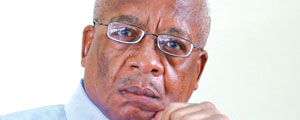
It goes without saying that for the past 13 years, Zimbabwe has been highly polarised, like two nations in one country.
Inevitably, the media, being a microcosm — that is, being representative or reflective of the whole range of views and opinions in the nation at large — has not been spared, with some outlets being staunchly pro-government and anti-opposition and vice-versa.
Virtually, every media house has been caught up in this, for better or, more likely, for worse.
Appealing for rapprochement so as to serve “the national interest”, Information minister Professor Jonathan Moyo last week said: “Polarisation hasn’t been in anyone’s interest, yourselves, ourselves or business. Of course, when we engage it does not mean we will agree on everything. However, at the end of the day, we should be able to agree on certain aspects and in that process, find each other.”
Earlier, Alpha Media Holdings group senior associate editor Iden Wetherell had told Moyo: “The public media cannot be a tool for one political party. We do not want to see abuse of the public media.”
Replied Moyo: “You and I have a duty to make sure it’s possible and I think your experience will help tell the youngsters that there is more to journalism than pushing political positions.”
Well, Vimbai Chivaura, Tafataona Mahoso and Sheunesu Mpepereki cannot be described as young, but they have poisoned and polluted the media with their blatantly one-sided presentations.
Whereas Zanu PF is one among other parties, they project it as the centre of all wisdom and experience and the opposition as evil of all evil, which is totally false. The public knows that human beings are fallible in both their personal and professional conduct and accept this. They want an accountable leader, not a demi-god. They know where to find God and that God is not voted for; that’s why they fill churches every Sunday.
- Chamisa under fire over US$120K donation
- Mavhunga puts DeMbare into Chibuku quarterfinals
- Pension funds bet on Cabora Bassa oilfields
- Councils defy govt fire tender directive
Keep Reading
If you listen to Chivaura, Mahoso and Mpepereki, you would think they patented the truth, whereas no one has copyright to the truth. They have no sense of history as they mostly dwell on a fabled version of the past to justify the political status quo. They go on and on about African pride, but the hair on one or two of them looks distinctly and unmistakably dyed, especially under TV studio lights. Is that African pride? That goes against elementary logic.
So, if Moyo is true to the spirit of hope and change and believes compromise is necessary in a divided nation, he ought to start by getting rid of this sorry, pathetic trio sooner rather than later.
Of course, the failings are on both sides. Indeed, some appointments in the private media have proved to be extremely dangerous. Highly excitable individuals with an exaggerated notion of themselves and tunnel vision who are after settling scores have risen to the top.
The private media should be reminded that there is no excuse to resort to gutter journalism just because there has been gutter politics. They must not be caught up in the polarisation game where they uncritically praise the opposition and scream at the government.
They should be able to report that the Welshman Ncube-led MDC lost the July elections dismally because they completely misread the changing mood of the people by failing to see that Ndebele interests are much the same as those of the whole country — jobs and the economy — making their ethno-nationalism and strategies redundant; and that the MDC-T fell terribly short in tactically responding to the Zanu PF machinery, barely holding onto their 2008 votes as Zanu PF doubled theirs. That said, the State media tends to report from the top-down (that is, from top officials with vested interests to protect), whereas the private media has generally reported from the ground up (that is, from the ordinary, powerless people’s perspective), which is often where the truth lies. Zimbabweans have known about the widening inequality and the explosion of obscene wealth among the politically well-connected, but the State media has dedicated itself to brushing this off. The State has at its disposal some of the greatest natural resources of any country: mineral wealth, principally diamonds, platinum and gold. Those riches give the government the ability to both repress and bribe the nation. There has been bribery, embezzlement, abuse of power and interference in murder case investigations. Does raising this threaten the national interest? Genuine dissent by publicly-spirited individuals is absolutely legitimate and necessary in a democracy. Should the media be silent in a situation where Local Government minister Ignatius Chombo has spent the last 13 years trying to delegitimise opposition-dominated councils? People need to maintain objectivity, not by throwing away values, but by critically evaluating and testing ideas and assumptions, and accepting what may be surprising or even displeasing based on the evidence. Only on that basis can the national interest be derived because many a time “official” explanations are incomplete and — worse — self-serving. Indeed, there have been significant achievements, but the to-do list remains far from finished. That is why you need a robust media to keep the government on its toes. The media should be relentless in pursuit of answers. The national interest, yes, but not ultra- nationalism of the rabid kind which has seen religious extremists like the Taliban bomb fellow Muslims merely because their brand of Islam is different from theirs. Zanu PF, like ruling parties everywhere, naturally gets the most criticism because it is the government in power and so has to heed everyone in the broadest sense of national interest. On that basis of sense, sensibility and sincerity can the national interest be served. Combining big brains — which you have, Prof — with big hearts, we can work this out.











